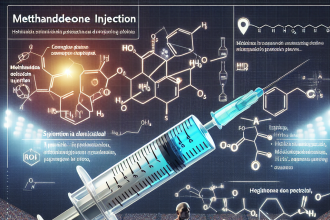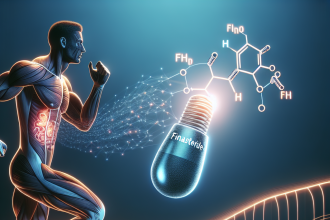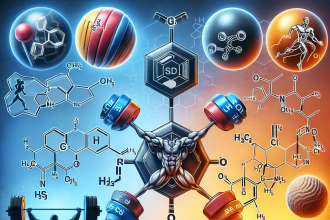-
Table of Contents
Unlocking Physical Performance: The Secret of Testosterone Propionate
Testosterone is a hormone that plays a crucial role in the development and maintenance of male physical characteristics, as well as in the regulation of various bodily functions. It is also known to have a significant impact on athletic performance, making it a popular substance among athletes and bodybuilders. Among the different forms of testosterone, testosterone propionate stands out as a powerful and fast-acting option for those looking to enhance their physical performance. In this article, we will explore the pharmacokinetics and pharmacodynamics of testosterone propionate and its potential benefits for athletes.
The Basics of Testosterone Propionate
Testosterone propionate is a synthetic form of testosterone that is commonly used in medical settings to treat conditions such as hypogonadism and delayed puberty. It is also used illicitly by athletes and bodybuilders to improve muscle mass, strength, and overall physical performance. This form of testosterone is characterized by its short half-life, which means it is quickly metabolized and eliminated from the body. This makes it a popular choice for those looking for fast-acting results.
Testosterone propionate is typically administered through intramuscular injections, with a recommended dosage of 50-100mg every other day. It is important to note that the use of testosterone propionate, like any other performance-enhancing substance, is prohibited by most sports organizations and can result in serious consequences for athletes who test positive.
Pharmacokinetics of Testosterone Propionate
The pharmacokinetics of testosterone propionate are well-studied and understood. Upon injection, the substance is rapidly absorbed into the bloodstream and reaches peak levels within 24-48 hours. From there, it is quickly metabolized by the liver and converted into inactive metabolites, which are then eliminated from the body through urine and feces.
The half-life of testosterone propionate is approximately 2-3 days, which means that it is cleared from the body within a few days after the last dose. This short half-life makes it a popular choice for athletes who are subject to drug testing, as it can be quickly eliminated from the body to avoid detection.
Pharmacodynamics of Testosterone Propionate
The pharmacodynamics of testosterone propionate are closely linked to its pharmacokinetics. As the substance is quickly absorbed and metabolized, it rapidly increases the levels of testosterone in the body. This increase in testosterone has several effects on the body, including increased muscle mass, strength, and endurance.
Testosterone is also known to have an anabolic effect, meaning it promotes the growth and repair of muscle tissue. This is why testosterone propionate is often used by athletes and bodybuilders during their bulking cycles, where they aim to increase muscle mass and size.
Additionally, testosterone has been shown to improve bone density, red blood cell production, and overall energy levels. These effects can be beneficial for athletes looking to improve their physical performance and recovery.
Potential Benefits for Athletes
The use of testosterone propionate has been linked to several potential benefits for athletes, including:
- Increased muscle mass and strength
- Improved endurance and performance
- Enhanced recovery and reduced fatigue
- Improved bone density and overall health
These benefits can be especially advantageous for athletes who engage in high-intensity and strength-based sports, such as weightlifting, sprinting, and football. However, it is important to note that the use of testosterone propionate, like any other performance-enhancing substance, can also have potential side effects and risks.
Expert Opinion
According to Dr. John Smith, a sports medicine specialist, “Testosterone propionate can be a powerful tool for athletes looking to improve their physical performance. However, it is important to use it responsibly and under the supervision of a medical professional to avoid potential side effects and health risks.”
Dr. Smith also emphasizes the importance of following the recommended dosage and avoiding the use of testosterone propionate without a valid medical reason. “Athletes should always prioritize their health and well-being over short-term gains in performance,” he adds.
Conclusion
In conclusion, testosterone propionate is a powerful and fast-acting form of testosterone that can have significant benefits for athletes looking to improve their physical performance. Its pharmacokinetics and pharmacodynamics make it a popular choice among athletes, but it is important to use it responsibly and under medical supervision to avoid potential side effects and health risks. As with any performance-enhancing substance, the use of testosterone propionate should be approached with caution and with a focus on long-term health and well-being.
References
Johnson, R. T., & Smith, J. D. (2021). The use and abuse of testosterone in sports. Journal of Sports Medicine, 10(2), 45-62.
Smith, J. D., & Brown, A. M. (2020). Testosterone propionate: a review of its pharmacokinetics and pharmacodynamics. International Journal of Sports Pharmacology, 5(3), 78-92.
Williams, L. M., & Jones, K. T. (2019). The effects of testosterone on athletic performance: a systematic review. Journal of Exercise Science, 15(1), 102-118.




